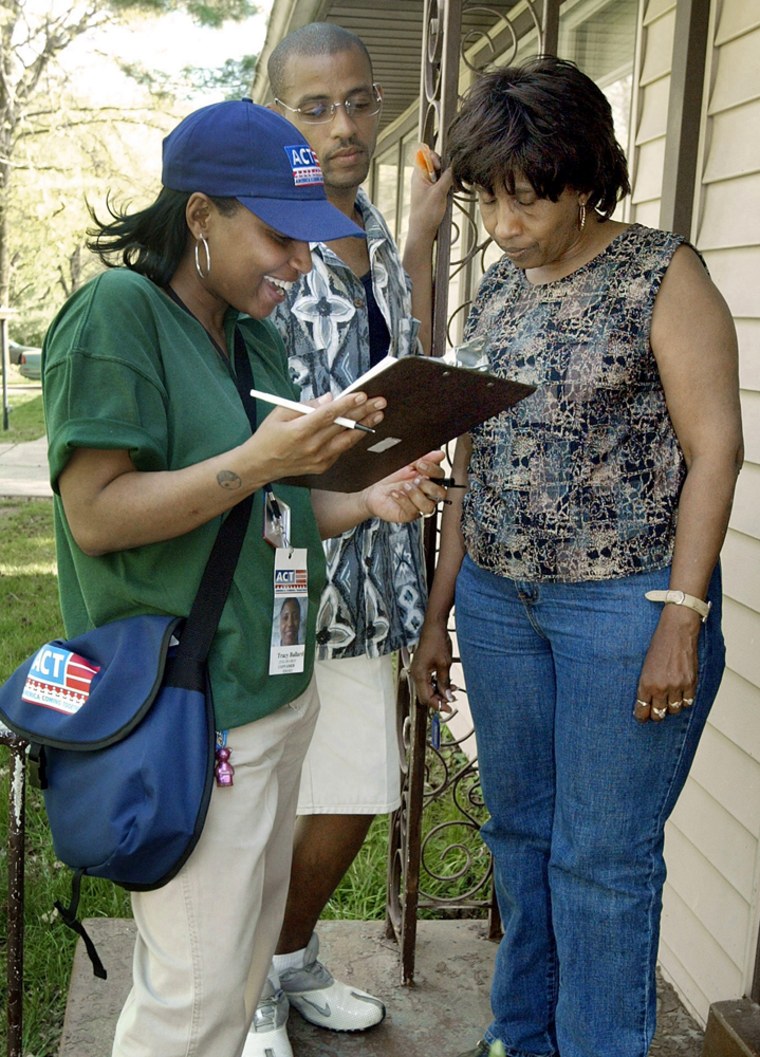Armed with Palm Pilots and a $95 million budget, Democratic organizers hope to exploit voters’ anger toward President Bush and the disputed outcome of the 2000 election to produce a record-breaking Nov. 2 turnout.
They’re doing it the old-fashioned way — knocking on doors and registering voters — with information-age technology, such as the hand-held computers carried street-to-street by canvassers.
“There’s going to be people crawling out of the woodwork to vote against Bush after what happened in 2000 and what he’s done since,” said Jean Jeffries, 59, of St. Louis. Six months before Election Day, Democratic organizers are already knocking on her door — making sure she and her children are registered to vote.
“People are fired up,” Jeffries said. “Anger is a powerful motivator.”
Democratic voters turned out in record numbers in several state primaries this year, especially when the outcome of the race was still in doubt. Voters said they were angry at President Bush, unhappy about the war in Iraq and badly wanted a candidate who could unseat the incumbent.
Missouri, 13 other states
In Missouri and 13 other states that will help determine this year’s election, an independent group called America Coming Together is working at what the Democratic National Committee used to do: Voter registration, recruitment and get-out-the-vote operations.
Campaign finance reforms forbid the DNC from raising unlimited “soft money” donations, but ACT can — as long as the group doesn’t coordinate with the DNC or Kerry’s campaign. The Republican National Committee has challenged the legality of ACT and other Democratic interest groups with the Federal Election Commission.
After razor-thin elections in several states four years ago, both parties have learned that while television commercials are still king, investing in solid outreach door-to-door is a prince of an idea.
“We now know that ground-game activities are the way to go,” said Donald Redmond, director of the Missouri ACT office. “It’s the star again, but we’re using technology to do it better.”
His team intends to knock on 850,000 to 1 million Missouri doors at least three to five times — identifying, registering and courting potential Democrats, then getting them to the polls.
Tracy Ballard, 34, carries a Palm Pilot — a hand-held minicomputer and organizer — on her clipboard while walking the streets of a predominantly black St. Louis neighborhood. Minorities traditionally have voted Democratic. “Hello, anybody there?” she yells into one house, her face pressed against the glass door.
Spotting the house’s owner inside, Ballard reads a list of names from her Palm Pilot. Marian Arthur, Robert Arthur, John Arthur — they’re all listed on state voting rolls as registered voters. Ballard gets a new address for John, and enters it into her Palm Pilot, then confirms that Marian and Robert plan to vote for Kerry.
Numerous contacts
The information will be fed into ACT’s main computers before sunset. The Arthurs will be contacted by phone, canvassers and e-mails several times before Nov. 2.
ACT plans to use the Palm Pilots to show voters political messages at their door, perhaps a word or two from the candidate himself.
At Jeffries’ home, Ballard learns that the woman’s adult daughter wants to register, but isn’t home. Borrowing Jeffries’ phone, Ballard calls the daughter and secures her Social Security number and other information needed to register her.
Jeffries son, Landon Brown, is visiting from Florida, the state Bush narrowly won after a Supreme Court fight went his way.
“They stole it,” Brown hisses.
The recount motivates many Democrats. “Most certainly, 2000” is a selling point for Democratic canvassers, Redmond said. “Everybody now knows every vote counts.”
500,000 doors in Minneapolis
In Minneapolis, Democratic organizers plan to knock on 500,000 doors. The typical voter will be visited at their home two or three times and receive up to a half dozen pieces of mail before Nov. 2.
In Iowa, the state party and ACT hope to replicate one of the nation’s most successful get-out-the-vote operations. A test case for deploying Palm Pilots, state Democrats dramatically increased absentee balloting in 2000 and swelled the margins of victory for Sen. Tom Harkin and Gov. Tom Vilsack in 2002.
“It’s the system that goes back to the very basics of politics — shoe leather and knocking on doors, rather than bombarding them with 50 mailers and 85 ads,” said Vilsack, often mentioned as a potential Kerry running mate.
“It’s also the passion,” said the Iowa governor. “People are doing what it takes to win. If it takes phone calling, driving people to the polls, walking on hot summer days door to door.”
